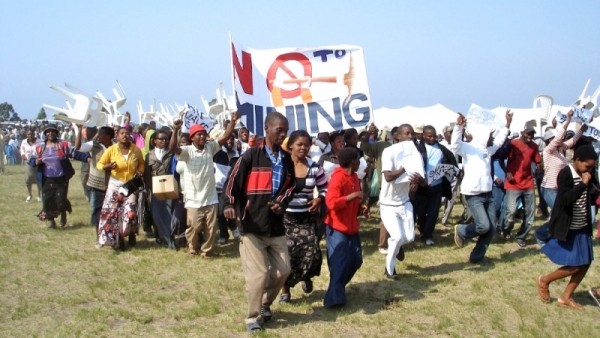Xolobeni goes to court over community rights versus mining
Case will shed light on land ownership and customary law
The Umgungundlovu community of Xolobeni on the Wild Coast has filed an application in the High Court in Pretoria, against a number of government officials, including the Minister of Mineral Resources and the Minister of Rural Development and Land Reform. The community is represented by the firm of human rights lawyer, Richard Spoor, and the Legal Resources Centre.
At stake is a mining rights application filed by Transworld Energy and Mineral Resources (TEM) over property presently held by the community in terms of customary law.
If granted, the mining activities will, according to the papers, affect – and most likely displace – over 115 residents in about 70 households who currently live on the proposed mining area and are parties to the case. However, as the papers explain, substantially more residents in the surrounding areas will be affected by the proposed mining activities.
The community is seeking an order preventing government from granting mining rights over property belonging to the community or, alternatively, that the right not be granted until the land owners have consented.
The community is also seeking an alternative order that, if the mining rights are granted, TEM compensate the community for any losses or damages which they are likely to suffer as a result of mining.
Under the Mineral and Petroleum Resources Development Act, an applicant for a mining right needs to consult with interested parties as part of the application process. However there is no requirement that an applicant needs to obtain the consent of a community holding rights in the land in order for the mining right to be granted.
The issue is complicated slightly by that fact that the land the community presently lives on is considered state land.
While the residents of the Umgungundlovu may not have formal title over the land, they are contending that the households (also known as imizi) living on the land have rights over both the residential and agricultural land in terms of customary law.
The community also argues that in customary law, it owns the remaining portions of the land not used and occupied by the imizi.
The papers also explain the why the land is necessary for the community’s survival, how TEM’s prospecting activities have hindered investment in the area’s tourism industry as well as the fact there are hundreds of graves in the proposed mining area.
Beyond the impact that mining activities will have on the community, the community argues that the granting of the mining right conflicts with its customary laws. The central tenant of the community’s customary law is that there needs to be consensus among community members before any property rights can be transferred or granted.
The papers highlight the importance of this consensus in preserving social harmony in the community. Any decision to approve mining operations without this consensus being obtained would ‘tear the community apart’ and be contrary to customary law, say the community papers.
However, their case is not based solely on the importance of preserving the community.
The community has invoked provisions of the Interim Protection of Informal Rights to Land Act, which protects people from being deprived of any informal rights to land they may hold. These informal rights may include the use and occupation of land in terms of customary law or practice of a tribe.
The community is arguing that the grant of mining rights over their land constitutes a deprivation of the rights in the land and as a result, the provisions of IPILRA (and their customary law) must be complied with.
This is not the first time that there has been tension between Legislation and customary law but it is not clear whether the provisions of the MPRDA will overrule the provisions of IPILRA. The community is contending that the MPRDA only prevails over common law and cannot prevail over other statutes or customary law but it is not clear whether the court will agree.
No court date has been set yet.
A battle has raged for years in Xolobeni between those for and against mining.
Read further GroundUp stories on Xolobeni.
This article was amended after publication to note that the Legal Resources Centre are also representing the applicants in the court case.
Support independent journalism
Donate using Payfast

Don't miss out on the latest news
We respect your privacy, and promise we won't spam you.
Next: Adam Habib: Wits is reaching a point of no return
Previous: Masiphumelele hearing postponed again
© 2016 GroundUp. 
This article is licensed under a Creative Commons Attribution-NoDerivatives 4.0 International License.
You may republish this article, so long as you credit the authors and GroundUp, and do not change the text. Please include a link back to the original article.

